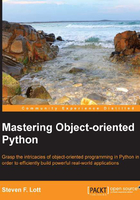
Making a frozen hand from a mutable hand
If we want to perform statistical analysis of specific Hand instances, we might want to create a dictionary that maps a Hand instance to a count. We can't use a mutable Hand class as the key in a mapping. We can, however, parallel the design of set and frozenset and create two classes: Hand and FrozenHand. This allows us to "freeze" a Hand class via FrozenHand; the frozen version is immutable and can be used as a key in a dictionary.
The following is a simple Hand definition:
class Hand:
def __init__( self, dealer_card, *cards ):
self.dealer_card= dealer_card
self.cards= list(cards)
def __str__( self ):
return ", ".join( map(str, self.cards) )
def __repr__( self ):
return "{__class__.__name__}({dealer_card!r}, {_cards_str})".format(
__class__=self.__class__,
_cards_str=", ".join( map(repr, self.cards) ),
**self.__dict__ )
def __eq__( self, other ):
return self.cards == other.cards and self.dealer_card == other.dealer_card
__hash__ = None
This is a mutable object (__hash__ is None) that has a proper equality test that compares two hands.
The following is a frozen version of Hand:
import sys
class FrozenHand( Hand ):
def __init__( self, *args, **kw ):
if len(args) == 1 and isinstance(args[0], Hand):
# Clone a hand
other= args[0]
self.dealer_card= other.dealer_card
self.cards= other.cards
else:
# Build a fresh hand
super().__init__( *args, **kw )
def __hash__( self ):
h= 0
for c in self.cards:
h = (h + hash(c)) % sys.hash_info.modulus
return h
The frozen version has a constructor that will build one Hand class from another Hand class. It defines a __hash__() method that sums the card's hash value that is limited to the sys.hash_info.modulus value. For the most part, this kind of modulus-based calculation works out reasonably well for computing hashes of composite objects.
We can now use these classes for operations such as the following code snippet:
stats = defaultdict(int) d= Deck() h = Hand( d.pop(), d.pop(), d.pop() ) h_f = FrozenHand( h ) stats[h_f] += 1
We've initialized a statistics dictionary, stats, as a defaultdict dictionary that can collect integer counts. We could also use a collections.Counter object for this.
By freezing a Hand class, we can use it as a key in a dictionary, collecting counts of each hand that actually gets dealt.